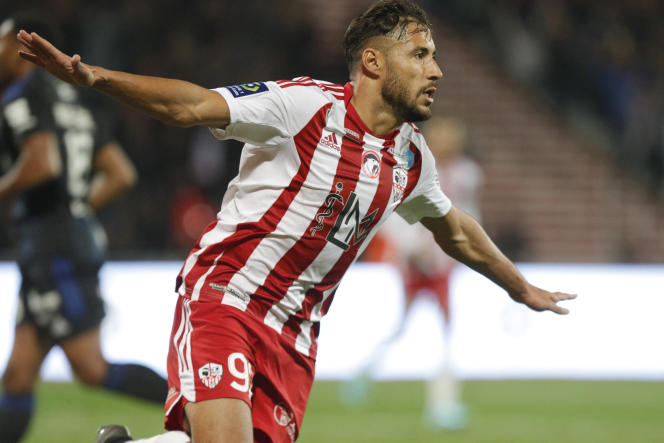The arrival, at the beginning of August, of Algerian international striker Youcef Belaïli (31), African champion 2019, at Mouloudia Club in Algiers did not go unnoticed. The player, reputed to be talented but unmanageable – his last experiences in France (Brest and AC Ajaccio) were marked by numerous disciplinary differences – signed a two-year contract there. But it is more the salary he will receive that has been talked about in Algeria, where the salaries of certain footballers tend to soar.
Indeed, local media and sources close to the club mentioned a monthly sum of 75,000 euros, making the Oranais the best paid player in the history of the Algerian championship. Mouloudia hastened to deny this figure, but without giving more details on what the player’s real salary would be. ” This amount seems plausible. MC Alger has a lot of money, since its main shareholder is Sonatrach, [la compagnie nationale des hydrocarbures]one of the biggest companies in Africa”, says Yazid Ouahib, head of the daily sports department El Watan. In July, the club had already recruited defender Djamel Benlamri (33) with a salary of nearly 30,000 euros.
This wage inflation does not concern all Algerian clubs, but it symbolizes the gap that is widening between those whose main shareholder is a state-owned company and the others. In addition to MC Alger, USM Alger (Serport) CS Constantine (National Well Works Company, subsidiary of Sonatrach), CR Belouizdad (Madar Holding) JS Saoura (Algerian Drilling Company, subsidiary of Sonatrach) , ES Sétif (National Electricity and Gas Company), JS Kabylie (Mobilis, a subsidiary of Groupe Telecom Algérie) are owned by state companies and now MC Oran, which has just come under the management of Hyproc Shipping Company, which also belongs to Sonatrach.
“We know that the USMA or Belouizdad pay high salaries to certain players, up to 30,000 euros per month. But MC Algiers goes further and it is not impossible that we will eventually see an outbidding from other clubs, especially those managed by state companies.intervenes a players’ agent on condition of anonymity.
A brake on a real player training policy
The salaries paid by the best financially armed clubs are obviously subject to debate. “It is considered public money, since some of them are managed by state companies. And in a country where many people struggle to make ends meet, that begs the question.”, remarks Yazid Ouahib. Figures that raise all the more questions as the level of the Ligue 1 championship is notoriously very average and the performance of Algerian teams on the continental scene disappointing, even if the USMA won the last edition of the Confederation Cup. African football.
“If clubs manage to pay high salaries for very good footballers and this allows them to be at the level of Egyptians, Moroccans, Tunisians or South Africans, why not. But this is not the case “, notes Nabil Neghiz. This coach, who left USM Khenchela to join Olympique de Béja (Tunisia) in July, also points to the precarious economic situation of several Algerian clubs. “Some offer salaries of 8,000, 10,000 or 12,000 euros, but they cannot afford to pay over the duration of the contract and there are many disputes with the players. »
The economic choice favoring the payment of attractive salaries constitutes an obstacle to a real policy of training players. An observation established by Ali Fergani, former international midfielder (1973-1986) then coach of the Fennecs (1995-1996 and 2004-205). “In Algeria, however, there is great potential. Tunisia, Egypt and Morocco, where clubs also pay good salaries, train many more players. But here, we prefer to spend fortunes on transfers and salaries rather than devoting them to young people. »
In the 1970s and 1980s, Algeria was renowned for the quality of its training and the local championship provided many players for the national team, as Ali Fergani recalls: “From now on, except for the Paradou club, few resources are devoted to training and we turn mainly to dual nationals, many of whom trained in France. Without them, our selection would not be at the level it is. »
